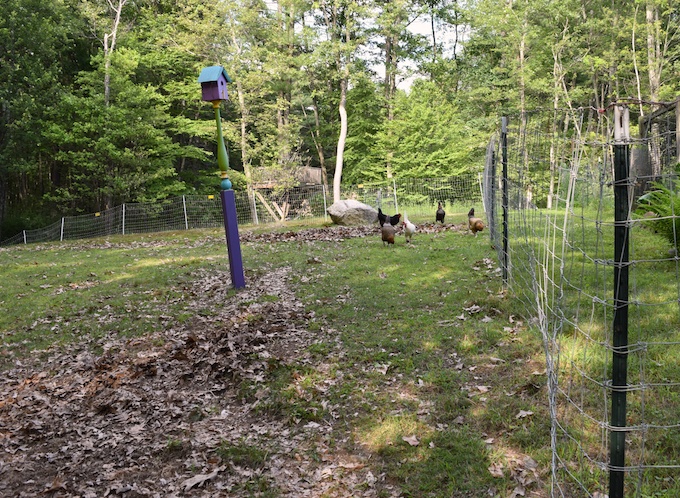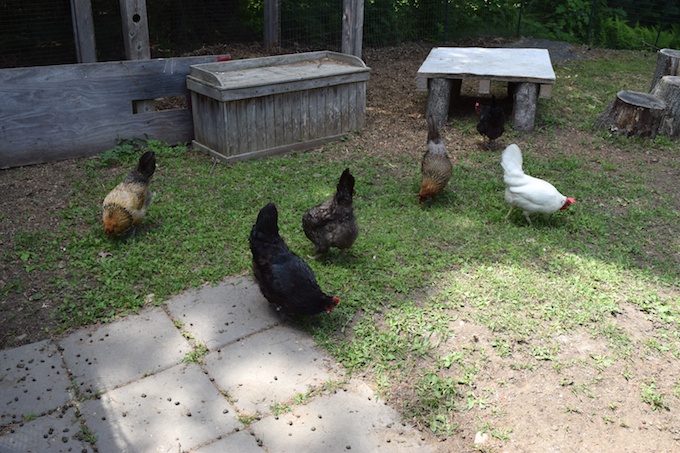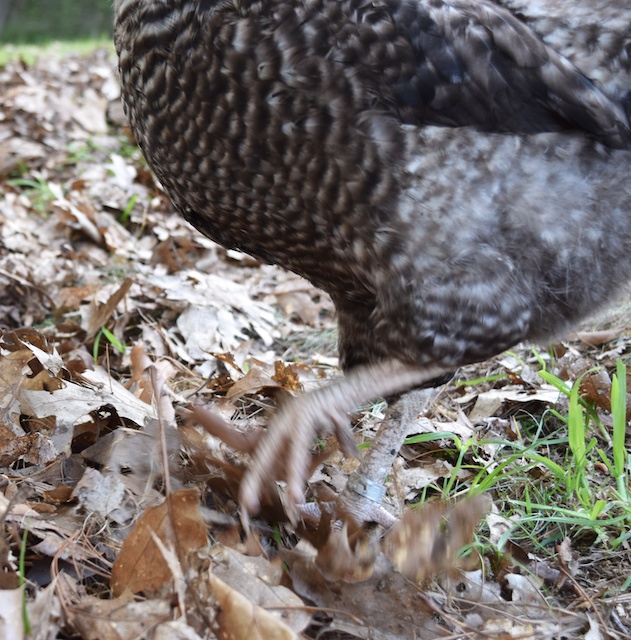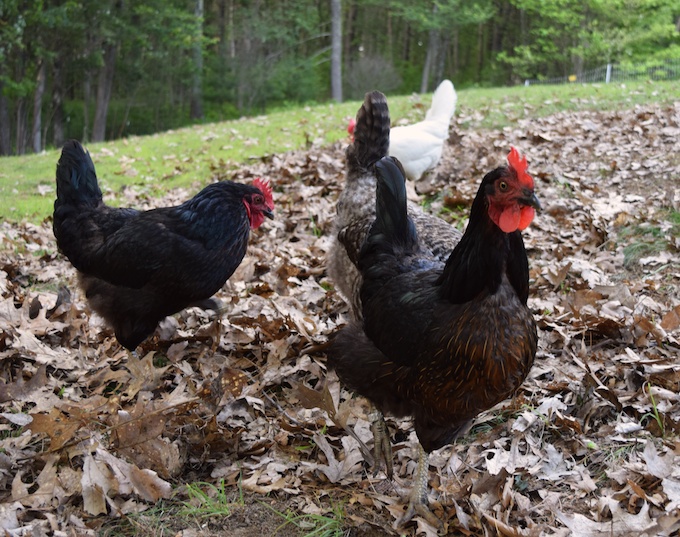It’s tick season. These nasty insects suck blood and spread disease. They lay in wait on tree trunks, in brush, in tall grass and in dried leaves, which are all of my goats’ preferred places, too. In past years, my goat boys have rubbed themselves raw trying to dislodge ticks burrowed half-under their skin. I’ve groomed them, and picked the ticks off, but they still caused misery.
This year, I put the Tick Patrol to work, and they’ve been doing a brilliant job of reducing the tick load in the pasture!
For reasons unknown, the hawks that nested year after year in woods at the back of the pasture did not return. There’s still a risk that a flying predator will come by, but I’ve been watching, and so far the skies are clear. In the afternoon, after the Ladies lay their eggs, I let them into the goat paddock, where they go to work, cleaning up insects that I can’t see (they help to control parasites that the goats might harbor)
and then they move into the larger pasture. Their dinosaur feet shred leaves and expose bugs.
No creepy crawlies escape their sharp vision.
In the next week I’ll be opening up the overgrown side of the pasture.
The Ladies will have their work cut out for them. So far, though, I’ve found only a couple of ticks on the boys. They are very grateful!
This is my first attempt to use chickens for tick control. I’ve been surprised at how successful it’s been. Guinea hens are supposed to be even better, but they’re very loud and don’t stay put, so I’ve not considered getting them. There will be a lot more ticks in the brush in the overgrown side of the paddock. I’ll let you know if the hens are up to that job.







Three cheers for the Tick Patrol! I wish mine would take on the Mosquitos.
Mine snatch mosquitoes out of the air but they don’t make a dent in the population.
do you then have to check the chickens for ticks?
I’ve never seen one on a hen, but judging by the comments here and by what I’ve seen on-line, birds do get ticks attached to them.
One of my hens had a teeny deer tick on the crease of her eyelid a few days ago. It was the size of a sesame seed. I held her while my dad got it off. It was quite the job. A wriggling hen not happy that we were touching her face while trying to pull a teeny tiny tick off…
It has been a horrible tick year in Southern Oregon. Took 20 off one cat in one day, ugh! Do the ticks ever end up on the hens?
The ticks are so bad this year we’ve removed several from our hens. Tiny deer tick nymphs attach themselves to their eyelids and wattle areas requiring twizzers for removal. I’ve added more DE to their favorite dirt bathing sites. That seems to be keeping the ticks at bay for now. Terry, do we need to worry about Lyme disease in our chickens?
Where are you? I’ve never seen ticks on my hens. Ugh. Awful! Studies show that birds can be intermediary hosts of Lyme disease. I can’t find anything about whether they come down with Lyme, themselves, but my best guess is that no, they just transmit. The ticks themselves, though, stick to the exposed flesh of the face and can be very irritating.
We live in a wooded and swampy area a few towns west of you, Bolton. Deer ticks are unfortunatly familiar to us. The nymphs are the tiniest I’ve ever seen. Hopefully the extra DE will continue to work. If not I’ll try to send a photo for your reference.
Yes, would like to see a photo. (But hope you can’t find any to take a picture of.)
My chickens’ number 1 job is tick and bug patrol. They are relentless. The eggs are just a perk.
The photos tell the tale, complete job satisfaction.
We had guineas on the farm growing up. Rarely did we find a tick on man or beast.
Glad the hawks have moved on.
If you are out and about with them a deadly attack is rare. Red tails seem to want to size up an adult chicken before going in for kill. They generally fly in and land on a object and size up the victim. Thus the running/flapping/squawking of the hens gives time to run in and save the day.
Thanks, Ken – good to know. One of the reasons I have been so hesitant to let my girls free-range is because I’m afraid a hawk will swoop down and pick them off before I have time to react. I did let them out for about 20 minutes last weekend, but I was following along literally right behind them.
I’ve had hens snapped up by red tails. So, no guarantees!
Terry,
They came in and carried them off?
Yes, of course, one was a Polish (no sense whatsoever) and the other was a bantam.
Ok, I’ve had bantams carried off as well. The few standard hens I’ve lost over the years the hawk ate in place.
An yes polish, hence my last two where named Whichway and Wrongway. I never will forget the day a hawk swoop over and Wrongway flew smack dab into the middle of an oak tree. The other hens took off in a panic, I’m convinced Wrongway had no clue as to why but decided she better panic as well. ;-)
My girls love to eat roaches, spiders and mosquitoes they find in their run/coop. We spray the yard with Spectracide for bugs monthly. My indoor/outdoor cats have never had ticks and I put Advantage on them for fleas/ticks just in case. Bug pests are horrible here in FL especially now in summer!
Terry, I saw the cutiest little birds (sparrows I think) going in and out of the barn for a quick meal.
Not cute for me! Sparrows can spread disease, and I don’t want to spend $ on feed for them. I shoo them out.
add a “t” to that word, it works better. ;-)
Yet another reason I yearn for chickens!
I’ve know people who have used Guinea Hens with great success for this purpose too. Ain’t Mother Nature grand. :-)
This is one of the main reasons we have chickens – to keep the ticks down. The eggs and the friendly, hen dispositions are a nice perk!
do Guinea fowl stand a chance with great horned owls? Here on the short grass plains we have quite a few hawks and at night we hear great horned owl. We’ve been thinking of Guinea fowl because they are supposedly great at warning about rattlesnakes. But from what we’ve seen of Guinea fowl, they tree roost at night and there is no way to get them to come inside.
I’ve never had guinea hens, so I can’t speak from experience. Given their druthers, they’ll roost outside, but you can train them to come in. Predators will get them when they’re outside.
We always raised them from keets with chicks. I don’t remember exactly anymore but they where probably 3 or 4 months old before dad allowed them to roam. I would say the greater majority came back and roosted in the henhouse. So Terry is correct they can be trained to roost indoors.
And yes great horned owls will definitely prey on them.
The other good thing about guineas is they are very predator “alert”. And because those that are sold by hatcheries are still identical to their wild cousins in Africa they are very good at avoiding daytime predators. Not fool proof of course. They are excellent flyers.
I have 40 guinea fowl and ~60 hens that are free-ranging. Yes, guineas are prolific tick eaters and they can be loud. However, they sound the alarm when any predator — flying or 4-legged — is in the area, thereby protecting the hens. Guineas have even faced down foxes, going into a V formation as a fox has come into “their” zone, advancing on the fox and driving it back. The racket made by the guineas confused the fox and alerted me to come running with a rifle in case I can get a good shot off. This has happened twice. Are they perfect to the point that I don’t lose any of guineas or chickens to predators? No … but the loss rate is considerably lower than it was. While a couple of guineas might decide to spend the night roosting in the trees next to the hen house, 99% of the time, they roost with the chickens. It’s probably a matter of training. When they are first released into “general population”, they are not allowed out of the hen house for a couple of days so that they learn to roost in the hen house. As free rangers, they do travel quite a ways when compared with the chickens. While the chickens stay within a range of 1 or 2 acres, the guineas might venture out over 5-10 acres. Occasionally, they’ve wandered over to neighbors that are about 1/4 mile away but they’re always home for treats and bedtime.
Thanks for sharing your experience. If I needed watch dogs, I’d get guineas. Did you know that certain branches of the military have used guineas to guard safe houses? Even Navy Seals can’t sneak past them.
Wow you have a lot of ticks out there! I also didnt know you could use hens for Tick Patrol, I will pass that onto our friends in MO, they have plenty of ticks and 25 hens! Useful as usual Terry, thanks!
My ladies have been going to town on the Japanese beetles this week
We found that our one-year old hens did great with ticks, but as they got older (and our older to begin with hens) got…for lack of a better word… lazy about it. They would get the big ticks, but stopped going after the smaller ones. I tested this theory by picking a small tick off of me, putting it on the ground in front of one of our 3 year olds, and she watched it walk away, and then went on with her business. Then again we were free-ranging 24/7 (we’re in the woods and the dogs usually run loose and scare other stuff off), and they weren’t as eager as they may have been had they been cooped up….
You’re absolutely right. Older hens don’t forage as avidly. It’s one reason why, when people say that they can retire their layers to be garden helpers, it’s not as good an idea as they think. It’s also why deep litter isn’t successful for older flocks. (I’ve written about why I don’t use deep litter: http://hencam.com/henblog/2013/12/why-i-dont-use-deep-litter/
I’ve heard guineas will keep ticks at bay, but I once lived on a farm that had them: it’s like listening to the neighbors car with a loose fan belt, and they park it outside your window and rev it up at random. I’m sure my chickens will do fine with what little is around. Even the rooster is pleasant to listen to in the morning.
Perfect description – of when the guineas are being quiet :)
The ticks are absolutely awful in PA. We have to put chemicals on the dogs (even I cringe about it, but we have to. They’re insanely bad) and my oldest dog still had a Lyme Disease scare a few months ago. One morning he wouldn’t get out of bed. He walked with a limp the day before, but that was the only other symptom (we figured he may have injured it playing with our other dog, or that he was just aging). He literally wouldn’t even lift his head. We took him to the vet and he tested positive for Lyme. After that, my dad said we needed guineas for their tick control. My little bantam cochin hen is now sitting on 6 guinea fowl eggs that are going to hatch on the 17th.
Poor old dog! I hope he fully recovers.